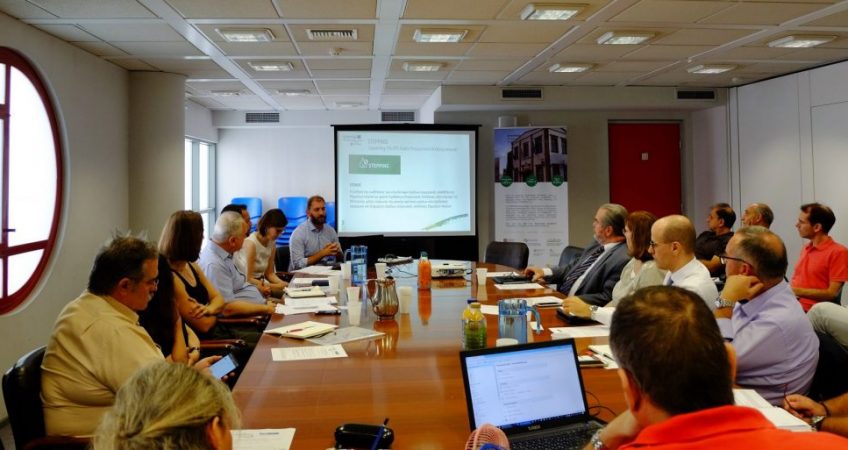The stakeholder round table on the “Implementation of Energy Performance Projects for Public Buildings through Energy Performance Contracts” that took place at the building of the Management Organisation Unit of Development Programmes (MOU SA) on Thursday, 11 July 2018, was extremely constructive.
The meeting was organised by the Aegean Energy and Environment Bureauin collaboration with the Directorate of Energy Policies and Energy Efficiencyof the Ministry of Environment and Energyand the support of the Sustainable Islands Network (DAFNI)within the framework of European project STEPPING. The Aegean Energy and Environment Bureau is planning to prepare investment projects for the energy upgrading of municipal buildings in 10 island municipalities using Energy Performance Contracts (EPCs).
Following the announcements of organisers Kostas Komninos and Alkistis Floros on the objectives of STEPPING and the actions to be carried out by the Aegean Energy and Environment Bureau, as well as a brief review of the national policy framework, following the latest developments at European level (new Directives on Energy Performance and Energy Efficiency in Buildings) a debate took place that highlighted the barriers and proposed solutions for the use of EPCs, taking into consideration the special conditions prevalent in island regions. These conclusions are particularly useful and are presented in the Annex.
The representation of central government bodies, bodies providing technical support to government agencies, the market, and credit institutions, was significant, and they managed to announce a number of initiatives on the issue in the course of the debate.
Ms. Sita, from the General Directorate for Energy, Greek Ministry of Environment and Energy, announced the immediate establishment of a new Registry of Energy Services Companies (ESCo), requiring the registration of companies with at least one energy service contract or EPC, while companies with no EPC will be allowed to register if they get an EPC within one year of the relevant Government Gazette issue being published.
Ms, Chryssou, from the Ministry of Economy and Development, advisor to Mr. Korkolis, Secretary General for Public Investments and NSRF, referred to Ministry’s initiatives in terms of co-financing holistic interventions in the public building stock with national and European Investment Bank funds. The newly created Infrastructure Fund is a good example in this direction.
Mr. Iatridis of CRES emphasized the possibility of combining EPCs and NSRFfor interventions in different parts of the building, e.g. electromechanical installations and window frames/shell respectively. To support the Municipalities in implementing projects using ECPs, the President of the Fund for Deposits and Loans, Mr. Varlamitis, reiterated that the Fund may grant guarantees and/or loans to Municipalities, if the latter takes on the cost of the investment.
ESCos were represented by ZEB, Greenesco and EUDITI. Mr. Papadopoulos (ZEB) referred to thecollective body of ESCosbeing establishedregulated by a Code of Conduct and to the recent EUROSTAT Guidelinesthat allow the possibility of not entering the capital flows of EPC projects in the balance sheets of municipalities in order to facilitate the latter when implementing such projects.
The deployment of pilot projects for the energy upgrading of municipal buildings with EPChas proven to be of utmost importance as it is going to contribute towards the clarification and standardisation of the roles of stakeholders involved in EPC projects, testing both companies and existing processes. The Aegean Energy and Environment Bureau has proposed the establishment of a structure that combines an EPC facilitator at national level (this role may be assumed by CRES), and decentralised regional consultants working together as well as with the market, ministries, credit institutions, etc. in order to speed up the implementation of such projects.
At this point, President Mr. Pantos and members of MOD’s Beneficiary Support Facility in Island and Remote Areas expressed their views on the need to also support the Municipalities before maturity stage, i.e. when selecting the most suitable buildings.
Finally, as regards the bundling of projects, credit institutions (TPD, NBG, Eurobank Property Services) and the ESCo market focused on the improved portfolio risk management and greater investment as the most positive points of this approach. This case is of particular interest to bodies such as DAFNI Network, which need to create bundling conditions to achieve economies of scale, due to their nature.
Given the constructive nature of the meeting and the need to coordinate actions, DAFNI and the Aegean Energy and Environment Bureau are planning a new meeting of stakeholders to review developments and to further coordinate actions.
PHOTOS


